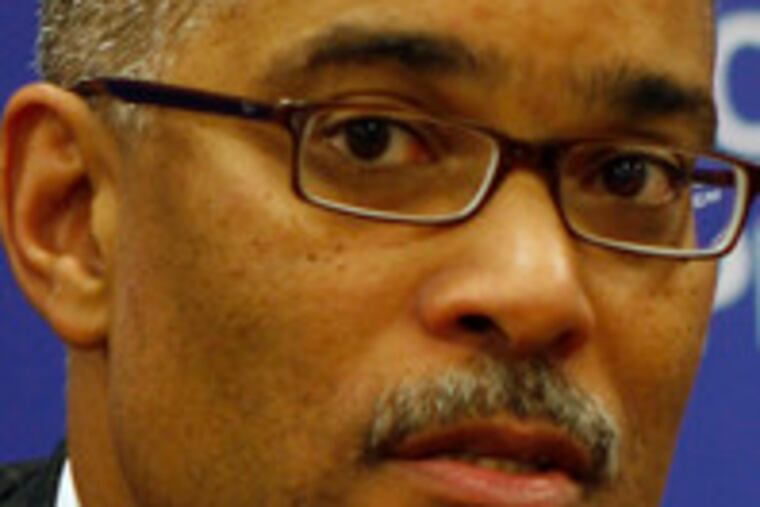District hears from 3 CEO candidates
A veteran urban school superintendent, a university education dean, and a former for-profit education company executive made their pitches yesterday for the Philadelphia School District's top job.

A veteran urban school superintendent, a university education dean, and a former for-profit education company executive made their pitches yesterday for the Philadelphia School District's top job.
For more than five hours, the three finalists for the $275,000-a-year position answered questions before a 45-member citizens panel at district headquarters, 440 N. Broad St., and later before a room full of reporters.
The School Reform Commission plans to select the next chief executive for the 167,000-student district by the end of this month or early next month. A spokeswoman said the commission would meet "as soon as possible" to discuss the three finalists, who were culled from a pool of 37 applications. The citizens panel, which included education advocates, business leaders, parents, students and union representatives, submitted written evaluations of the finalists to the commission.
Members contacted last night said there appeared to be no universal favorite. A few members suggested at the meeting that the commission reopen the search.
Arlene Ackerman, a former superintendent in Washington and San Francisco, is the only finalist who has experience running urban school systems. Based on that experience, she said, she would work early on to involve social services, mental health, and other community agencies to make schools better.
"As I think about what I would do differently, it would be to have that kind of coordinated effort at the very beginning," said Ackerman, 61, a professor at Columbia University's Teachers College.
Ackerman, who brought in the FBI to investigate corruption in the San Francisco school district, said she supported paying teachers at different rates based on performance and other factors.
"This is controversial, but I'm known for my controversy," she said. "I think we need to look at incentives that actually differentiate pay for teachers, just as we do for medicine or law."
To help the lowest-performing schools, she said, she would target perennial problems, such as lack of substitutes, inexperienced teachers, and low parent involvement.
She said she also would work very closely with Police Commissioner Charles H. Ramsey, whom she knew when she headed the Washington school system in the late 1990s. They lived in the same apartment building.
Kent McGuire, 52, the dean of the college of education at Temple University and a former education policy analyst, said he could bring change to the district. He said he had spent his career watching what was happening educationally around the country and testing ideas to figure out what worked.
If hired, he said, he would focus in his first year on better teacher hiring, improved instruction for students learning to speak English, and more support for education in the classroom.
McGuire said he also would try to improve the district's data systems, so trends could be more closely monitored and improvements made.
While he praised the Philadelphia district's standardized curriculum, he said it hadn't been implemented as well as it should have been. As a result, he said, the district will get "incremental increases" but then "hit a wall."
"To punch through that wall requires powerful teaching, high-quality instruction across many classrooms in many schools," said McGuire, a resident of Moorestown who previously worked at the U.S. Department of Education under President Bill Clinton and held other education policy jobs.
Leroy D. Nunery II, 52, of Wyndmoor, who formerly ran Edison Schools' charter-school division, emphasized his background in business and education as strengths.
He said he had run a family business, was a business executive at the NBA, and was a vice president at the University of Pennsylvania, where he ran "20 businesses at one time."
Nunery declined to discuss the reasons he left Edison in 2007 after two years.
"I left on my own," said Nunery, who now heads his own educational consulting business. He declined to say whether he saw a reduced or expanded role for Edison in the district. Edison currently runs 20 district schools.
"I will evaluate every partner that we have," he said.